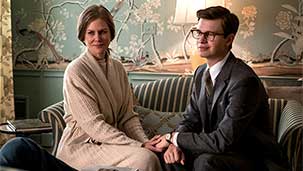Your role on a film set, as far as I can tell, is to assist the production in reducing its carbon footprint. Initiatives to limit paper use or calm idling trucks on a film set don’t seem like they can make much of a difference individually, but added up, the impact is immense. If nothing else, it’s the sign of a production team that cares about getting the details right. Or so I thought.
So it seems unfathomable that an adaptation of a Pulitzer Prize-winning novel, a cast that includes Nicole Kidman, Sarah Paulson, and Jeffrey Wright, a legendary cinematographer like Roger Deakins, and a director whose previous film was the multi-Oscar nominated Brooklyn, could end up stinking like a compost pile on a hot summer’s day.
The Goldfinch isn’t awful. It didn’t make me angry the way most awful films do. At least awful films demand a response. I can rage about a film’s cynical cash-grabbiness or roll my eyes at its try-too-hardiness. Awful films get me revved up. But The Goldfinch made me feel…nothing. So much nothing that I don’t even care to understand how it all went wrong. It burned two-and-a-half hours of my life, and now I have to spend more time trying to make sense of the whole mess.
Never has so much (too much) narrative amounted to so little. The plot, such as it isn’t, involves a young boy named Theo who has just lost his mother to a terrorist attack at the MOMA. He moves in with his rich friend’s family, the Barbours, and meets another survivor, Pippa. He befriends Pippa’s caregiver, Hobie, who had co-owned an antiques store with Pippa’s uncle. Oh, and Theo’s hiding a painting he stole from the MOMA following the attack. These are less plot points rather than Things That Happen. And a lot of things happen in The Goldfinch. Theo’s estranged alcoholic, con-man dad brings him to live in Nevada. Theo befriends another misfit named Boris and the two drown their domestic sorrows in booze and pills.
Then more things happen. Things which would normally inform character, build tension, or set up the climax completely fail to resonate thanks to an emotionally detached and phlegmatic tone that constantly keeps us at arm’s length. We should care about Theo. We should care that he runs away and reconnects with Hobie and Mrs. Barbour, the only two people who were trying to look out for him after his mother died. We should care that he grows up to become Ansel Elgort. Most of all, we should care about what happens to the titular painting. But we don’t. The film gives us no reason to.
If The Goldfinch succeeded at eliciting an emotion from me at all it was pity for the poor cast who did their best to navigate this raging tire fire. Even the most awful of films will have at least something I can begrudgingly praise. There was not one moment in this whole lethargic exercise – no line of dialogue, or performance, or visual - which resonated even one mote. This film lacked heart, and even worse, it lacked brevity.
The fact that the director John Crowley had so much magic to work with and failed so epically hard is almost impressive. Almost.
What a colossal waste.
Sincerely,

Di







